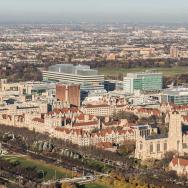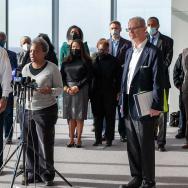Addressing the epidemic of gun violence in Chicago will require a coordinated, sustained effort that addresses the root causes of violence, University of Chicago and local leaders said during a Jan. 25 event hosted by the University. Those efforts, they said, must involve evidence-based, community-centered interventions that seek to prevent violence and help individuals recover from trauma.
The roundtable discussion at the David Rubenstein Forum explored broader strategies to prevent violence by supporting the social and economic health of the University’s neighboring communities. It was the latest in a series of University-led conversations on public safety on campus and in the South Side community.
“We sometimes refer to the ‘University community’ and the ‘local communities,’ but the reality is that we are deeply intertwined. We are partners at so many levels,” said President Paul Alivisatos. “We are a shared community, and the crisis of violence affects all of us. It is an issue that we will address together.”
Alivisatos announced the University’s intent to work with the broader South Side community to design and launch a new multi-year fund aimed at reducing violence by supporting and encouraging partnerships between the University and community-based organizations. The University plans to engage stakeholders throughout the next two months, announce details of the fund in the spring, and issue the fund’s first grants by summer, Alivisatos said.
In her virtual remarks, Illinois Lt. Gov. Juliana Stratton outlined the state’s four-year Reimagine Public Safety Act plan that is investing $250 million in addressing gun violence through partnerships with community-based organizations. When tackling these issues, she added, policymakers, leaders and other experts must unpack the harm caused by decades of disinvestment—predominantly to neighborhoods of color.
“We are using data and holistic strategies to approach this problem like a public health crisis—because that’s what it is. For too long, policies have turned to punitive measures that don’t address the root causes of violence in our neighborhoods,” said Stratton, a South Side native. “It’s easy to feel helpless amid so much grief and trauma. But we all have a role in addressing the systemic issues that hurt us and our neighbors. This truth, and the knowledge that our communities know best what they need to thrive, will guide us.”
Deborah Gorman-Smith, dean of UChicago’s Crown Family School of Social Work, Policy and Practice, spoke to the complex intersection of challenges that perpetuate violence, including longstanding racial and social inequities. As director of the Chicago Center for Youth Violence Prevention, Gorman-Smith shared some details about the data-driven community action plan that CCYVP has been implementing in recent years in partnership with local groups and UChicago Medicine’s Urban Health Initiative. Since the plan has been in place, the team has seen a 14 percent drop in robberies in their focus area in comparison to similar Chicago neighborhoods, a 10 percent drop in aggravated assaults, and a 17 percent drop in shootings.
To illuminate the depth and scale of disinvestment in the Bronzeville community, Pastor Chris Harris recalled discovering his son had received the same decades-old textbook he had once used as a child. Programs such as those enacted by CCYVP, Harris said, have helped shift perceptions and foster mutually beneficial progress between the University and the broader community.
“The folks here had to respect the knowledge base and the experience of the community,” said Harris, who is CEO of Bright Star Community Outreach and senior pastor at Bright Star Community Church. “We didn’t speak their language, and they didn’t speak ours, and so bringing us all to the same table to have conversations, it allowed them to respect us and allowed us to respect what their knowledge was. That’s what’s been exciting. That is something extraordinarily different. And I think much more of that has to happen.”
Roundtable participants discussed other promising joint efforts, including UChicago Medicine’s Violence Recovery Program, which identifies patients at risk of repeat injuries from violence and connects them and their families to hospital and community-based wrap-around services. The program has served nearly 9,000 trauma patients since its founding in 2018.
“Forty percent of the patients that we engage with accept the interventions, whether it's a work program with READI, whether it’s programs that Bright Star Community Outreach provides,” said Brenda Battle, senior vice president for community health transformation at UChicago Medicine. “Our violence recovery specialists help them with housing, food. These are things, these social determinants of health, that will mitigate some of the immediate needs that they have so that you can move them toward long-term recovery and long-term solutions.”
The event also highlighted Heartland Alliance’s partnership with UChicago’s Crime and Inclusive Economy labs on READI Chicago, an intensive violence reduction initiative that offers men at the highest risk of experiencing violence “a different option for their life,” said Evelyn Diaz, president of Heartland Alliance. The initiative pairs 18 months of paid employment with cognitive behavioral therapy, which helps those traumatized by violence slow down their thinking and better respond to stressful situations that too often contribute to the cycle of violence.
The therapy “has helped to change everything from their future orientation, their life goal, to how they acted in a heated moment,” said Diaz, noting partners have engaged 1,600 people and invested $9 million in wages in the initiative’s first five years.
At the heart of many of these strategies, panelists said, is strong partnership and trust.
Jalon Arthur, director of strategic initiatives at Chicago CRED, spoke of his organization’s groundbreaking relationship with UChicago Medicine. CRED’s street outreach team has unfettered access to UChicago Medicine’s Trauma Center, where they’re able to reach victims and their networks in the critical hours after a shooting—when the threat of retaliation is highest.
“To deliver on this work, you need strong community-based organizations because they're on the front lines in their community,” said Derek R.B. Douglas, UChicago’s vice president for civic engagement and external affairs. “They have the respect; they have the trust.”
One way the University can continue to support those organizations in the communities experiencing the most violence is through programs like the Office of Civic Engagement’s Community Programs Accelerator, Douglas added. The Accelerator helps nonprofits fulfill their missions through support such as board development, strategic planning, or grant writing guidance.
This work is complex, often disheartening, and can take decades of sustained commitment, panelists said. It’s important to recognize there’s no “magic solution,” and no institution or organization can address violence prevention alone.
“The whole goal is to make sure that every young person grows up with opportunity, so that all our children can flourish, and that begins at a very early age,” said Valerie Jarrett, CEO of the Obama Foundation. “We need these interventions at key points in their lives where we can change the trajectory of their lives and there are clear strategies for how to do that.”
“The work that we are embarking on here in Chicago can really be a template for what should happen around the country,” Jarrett added. “You have to have local leadership that’s strong. You have to have evidence-based practices. You have to have large institutions that can provide an economic engine, whether it's the University or the Obama Center—that’s going to help spur opportunity and create it.
“And you have to have people in the community who are willing to have honest, difficult conversations with one another, which you can only have in safe spaces like the one we've created here tonight, and where we have a listening audience from all over the city, who I hope is feeling what we feel, which is that level of pragmatism, but also optimism.”

